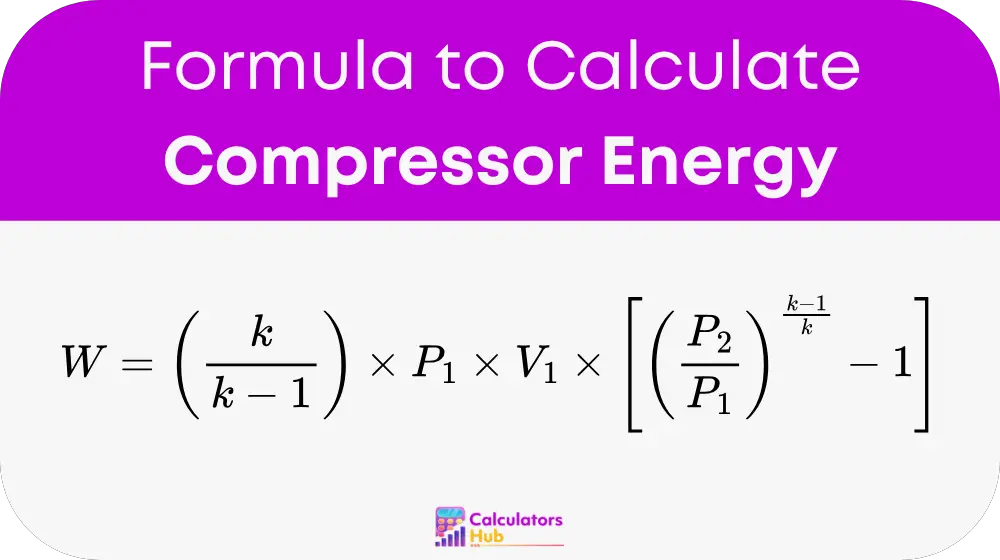The Compressor Energy Calculator determines the amount of energy required to compress a gas from an initial state (inlet pressure and volume) to a final state (discharge pressure). It accounts for different compression processes, such as adiabatic (no heat exchange) or isothermal (constant temperature). This tool is essential in various industries, including HVAC, manufacturing, and gas processing, to optimize compressor performance and energy efficiency.
Why Is It Important?
Accurate energy calculations ensure compressors are designed and operated efficiently, reducing energy costs and improving system reliability. It also helps engineers evaluate the feasibility of compressor systems for specific applications.
Formula of Compressor Energy Calculator
Adiabatic Compression (No Heat Exchange)
For adiabatic compression, the energy required is calculated as:

Variables:
- W: Work done (Joules or other energy units).
- k: Adiabatic index (ratio of specific heats, Cₚ/Cᵥ, approximately 1.4 for air).
- P₁: Inlet pressure (absolute, in Pascals or consistent units).
- V₁: Inlet volume (cubic meters or consistent units).
- P₂: Discharge pressure (absolute, in the same units as P₁).
Isothermal Compression (Constant Temperature)
For isothermal compression, the energy required is:
W = P₁ × V₁ × ln(P₂ / P₁)
Variables:
- ln(P₂ / P₁): Natural logarithm of the pressure ratio.
Steps to Calculate:
- Determine Input Parameters:
- P₁: Absolute inlet pressure. If gauge pressure is given, convert it by adding atmospheric pressure (typically 101.3 kPa or 14.7 psi).
- P₂: Absolute discharge pressure.
- V₁: Inlet volume of the gas.
- k: Adiabatic index, typically 1.4 for air unless another gas is specified.
- Choose the Compression Type:
- Use the adiabatic formula for rapid compression with no heat exchange.
- Use the isothermal formula for slow compression with heat dissipation.
- Substitute Values:
- Substitute the known values into the chosen formula to calculate the energy required.
Pre-calculated Table for Common Scenarios
Below is a table showing energy requirements for air compression under typical conditions, assuming V₁ = 1 m³ and P₁ = 101.3 kPa (1 atm):
| Compression Type | Compression Ratio (P₂ / P₁) | Discharge Pressure (P₂, kPa) | Energy (W, kJ) |
|---|---|---|---|
| Adiabatic | 2 | 202.6 | 91.5 |
| Adiabatic | 3 | 303.9 | 149.2 |
| Isothermal | 2 | 202.6 | 70.1 |
| Isothermal | 3 | 303.9 | 101.5 |
This table provides a quick reference for typical compression scenarios.
Example of Compressor Energy Calculator
Scenario
A compressor compresses air from an initial pressure of 101.3 kPa (1 atm) to a final pressure of 303.9 kPa with an inlet volume of 1 cubic meter. Calculate the energy required for both adiabatic and isothermal compression.
Step-by-Step Calculation
Adiabatic Compression:
- Input Parameters:
- P₁ = 101.3 kPa = 101,300 Pa.
- P₂ = 303.9 kPa = 303,900 Pa.
- V₁ = 1 m³.
- k = 1.4 (for air).
- Apply the Formula:
W = (k / (k – 1)) × P₁ × V₁ × [(P₂ / P₁)^((k – 1) / k) – 1]
W = (1.4 / (1.4 – 1)) × 101,300 × 1 × [(303,900 / 101,300)^((1.4 – 1) / 1.4) – 1]
W = 3.5 × 101,300 × [(3)^0.2857 – 1]
W ≈ 3.5 × 101,300 × (1.2314 – 1)
W ≈ 3.5 × 101,300 × 0.2314 ≈ 82,045.35 J.
Isothermal Compression:
- Input Parameters:
- P₁ = 101,300 Pa.
- P₂ = 303,900 Pa.
- V₁ = 1 m³.
- Apply the Formula:
W = P₁ × V₁ × ln(P₂ / P₁)
W = 101,300 × 1 × ln(303,900 / 101,300)
W = 101,300 × ln(3) ≈ 101,300 × 1.0986 ≈ 111,251 J.
Most Common FAQs
The calculator estimates the energy required to compress a gas under specified conditions, helping optimize energy usage in industrial and mechanical systems.
Yes, but you must use the specific adiabatic index (k) for the gas in question. For example, k = 1.66 for helium.